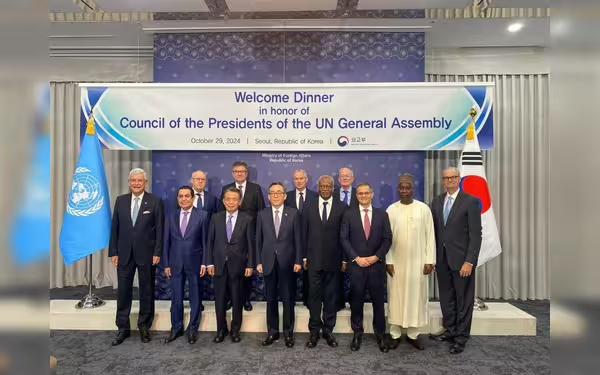Thursday, November 7, 2024 07:37 AM
UNCPGA Urges Ceasefire Amid Global Conflict Concerns
- UNCPGA calls for ceasefire in Gaza and Lebanon.
- Council emphasizes adherence to UN Charter principles.
- Humanitarian crisis in the Middle East demands urgent action.
 Image Credits: menafn
Image Credits: menafnUNCPGA expresses concern over global conflicts, urging ceasefire in Gaza and Lebanon while addressing humanitarian crises.
The ongoing conflicts around the world have raised significant concerns among global leaders, particularly in the context of the recent meeting held by the Council of Presidents of the United Nations General Assembly (UNCPGA) in Seoul, South Korea. This meeting, chaired by Dr. Han Seung-soo, brought together various dignitaries, including HE Nassir bin Abdulaziz Al Nasser, the President of the 66th session of the UN General Assembly. The discussions focused on the pressing need for peace and security, especially in light of the escalating violence in regions such as Gaza and Lebanon.
During this sixth meeting since its revival in October 2022, the Council emphasized the importance of adhering to the principles outlined in the UN Charter. The members expressed their commitment to promoting peace, security, and human rights, which are essential for a stable global community. The keynote address by Philemon Yang, the current President of the General Assembly, underscored the theme of "Unity in Diversity," highlighting the necessity of revitalizing the Assembly and strengthening its leadership.
One of the most alarming issues discussed was the increase in armed conflicts worldwide. The Council expressed deep concern over the growing polarization within the international community and the geopolitical divisions that have emerged. They noted the serious violations of the UN Charter and international law, calling for bold leadership to support multilateralism. This is crucial as the world grapples with complex challenges that require collective action.
The humanitarian crisis resulting from the ongoing conflict in the Middle East was a focal point of the discussions. The Council condemned the high number of civilian casualties in Gaza and rejected Israeli laws that hinder the operations of the United Nations Relief and Works Agency for Palestine Refugees (UNRWA). They called for immediate humanitarian access to alleviate the suffering of those affected by the conflict. Furthermore, the Council condemned the Israeli attacks on UN forces in Lebanon, reiterating the need for protection of civilians in conflict zones.
In a positive development, the Council welcomed the ongoing ceasefire negotiations taking place in Qatar. They urged all parties involved in the conflict to engage in sincere diplomatic efforts, viewing this as a vital first step towards establishing a comprehensive peace plan based on the two-state model. This approach aligns with relevant Security Council and General Assembly resolutions and emphasizes the importance of economic cooperation in the region.
The meeting also addressed the ongoing conflict between Russia and Ukraine, highlighting its humanitarian repercussions. The Council called for an immediate cessation of hostilities and stressed the importance of preventing nuclear escalation. Additionally, they expressed concern over the deteriorating humanitarian situation in Sudan, advocating for support for UN efforts in that region.
Another significant topic of discussion was the impact of artificial intelligence on global society. The Council recognized both the opportunities and challenges presented by this technology and decided to form a committee of experts to propose a global framework for its regulation. Establishing a trust fund to support this initiative reflects the Council's commitment to international cooperation and enhancing peace and security in the face of current challenges.
The UNCPGA's meeting in Seoul serves as a crucial reminder of the urgent need for global cooperation in addressing conflicts and humanitarian crises. As the world faces increasing challenges, the call for peace, security, and multilateralism becomes ever more vital. It is imperative for nations to come together, not only to resolve existing conflicts but also to prevent future ones, ensuring a safer and more stable world for generations to come.













